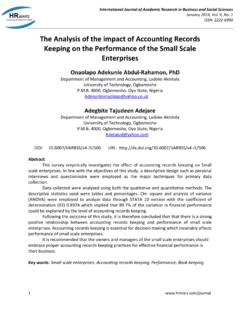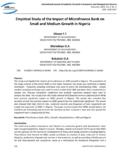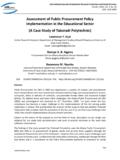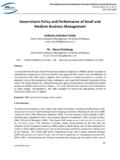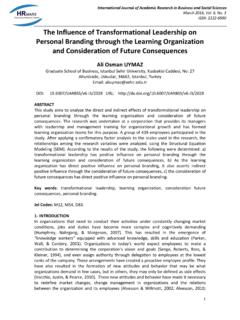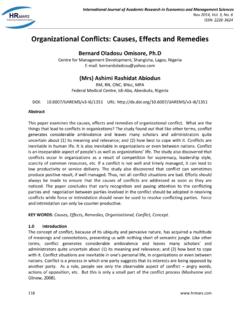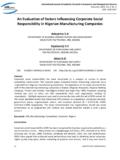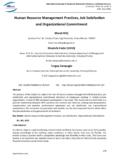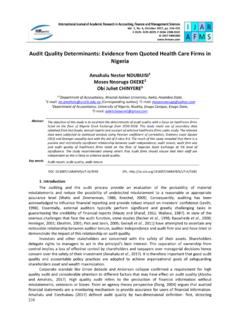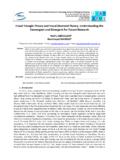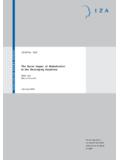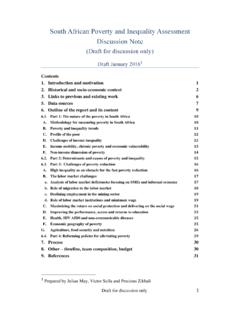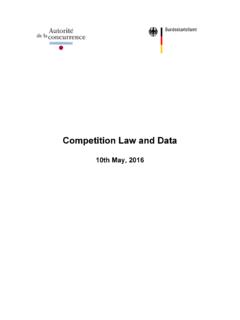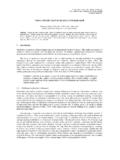Transcription of Exploring Educational Administration: The …
1 International Journal of Academic Research in Business and Social Sciences January 2014, Vol. 4, No. 1 ISSN: 2222-6990 525 IJARBSS impact Factor: (Allocated by Global impact Factor, Australia) Exploring Educational administration : The Relationship between Leadership and Management Masitah Shahrill Sultan Hassanal Bolkiah Institute of Education, Universiti Brunei Darussalam, Tungku Link Road, Gadong, BE 1410, Brunei Darussalam DOI: URL: ABSTRACT There have been many on-going debates on the agreement to the meaning of administration , leadership and management. This paper explores the distinctions between Educational administration , Educational leadership and Educational management and what are entailed in terms of their differences and similarities in nature. Keywords: Educational administration , Educational Leadership, Educational Management. Introduction Leaders are truly of this world and simultaneously apart.
2 They are temporal and ephemeral beings. Their personal and professional relationships are so close, yet so far away (Sullivan, 2004, p. 19)..inspiring hope is the first and last responsibility of the Educational leader (Walker, 2005, p. 29). How does one distinguish between Educational administration , Educational leadership and Educational management? Obviously, the response to this question will be by investigating what past researchers in these Educational fields say about each of these terms. In almost all of the books or articles the author has cited there have been debates on the agreement to the meaning of administration , leadership and management. Nevertheless, Cunningham and Cordeiro (2006) stated that agreement was reached in defining administration as the broadest term related to organisational responsibility, leadership focused on organisational direction and purpose, and management, on the other hand focused on the efficient use of resources.
3 Furthermore, leadership is about doing the right things, management is doing things right, and administration is responsible for both leadership and management. Administrators carry the biggest burden because they are expected to be effective leaders and efficient managers. In this paper, the author will investigate firstly the definition of Educational administration and the essence within this area. In the next section the author will provide past researchers explanations on the use of each of the Educational terms. The third section however, deals with International Journal of Academic Research in Business and Social Sciences January 2014, Vol. 4, No. 1 ISSN: 2222-6990 526 IJARBSS impact Factor: (Allocated by Global impact Factor, Australia) the task of finding a connection or relationship by specifically focusing only on Educational leadership and Educational management. With regards to reporting on Educational leadership effects, the fourth section will involve Exploring these effects in Brunei Darussalam (hereafter, Brunei).
4 The fifth section focuses on the heart of the paper in which answers to the following questions will hopefully be reached; how does Educational leadership matter? To whom does it matter most? What means do leaders take in order to achieve successful Educational leadership? Finally, an overall summary of the paper will be given in the conclusion section. Exploring Educational administration This section does not intend to investigate the theoretical approaches made by Evers and Lakomski s (1996) from their second book entitled Exploring Educational administration . However, what the author intend to do here is to explore her understanding of; first and foremost, what is Educational administration and what does it entail? Sergiovanni, Burlingame, Coombs and Thurston (1980) firstly defined administration as the process of working with and through others in order to accomplish organisational goals efficiently.
5 Furthermore, they viewed administrators as those who are responsible for accomplishing certain objectives efficiently. Subsequently, Sergiovanni et al. (1980) viewed administration as the art and science of getting things done efficiently. Secondly, in terms of Educational administration , in the United States, according to Sergiovanni et al. (1980), The governance and administration of education is a good example of the nature and importance of administrative activity in our society (p. 4). In addition, the Educational establishment ranks among the largest of public and private enterprises. Thus, Educational administrators from all levels, from superintendents to chairpersons, take their roles seriously in order to build quality education. In Figure 1 below, Sergiovanni et al. (1980) provided three critical aspects entailed within the job of Educational administrators. International Journal of Academic Research in Business and Social Sciences January 2014, Vol.
6 4, No. 1 ISSN: 2222-6990 527 IJARBSS impact Factor: (Allocated by Global impact Factor, Australia) Figure 1: The three critical aspects of Educational administrators According to Cunningham and Cordeiro (2006), the study of administration is grounded in science and philosophy and, in theories and ethics. Those who have an interest in Educational administration consider it to be crucial for administrators to understand and develop belief systems and philosophies for their practice (Barnett, 1991, as cited in Cunningham & Cordeiro, 2006). Thus, a person s epistemology; that is, the way a person thinks, determines reality and the way that person approaches work, is critically important. There are seven factors (functions, skills, ethics, structure, operational areas, context, and issues) which can be conceptualised in the synthesis of knowledge in Educational administration (Cunningham & Cordeiro, 2006).
7 Table 1 below was taken from Table of Cunningham and Cordeiro (2006, p. 26) that represents a comprehensive model of the complexity of Educational administration in the United States. Furthermore, by taking the factors into consideration, they stated: Even though in practice factors cannot be separated, it is probably best to focus on and integrate one factor at a time. Each leads to some truth, but none by itself affords an adequate understanding. Together they provide a more complete understanding of Educational administration . (Cunningham & Cordeiro, 2006, p. 25). In a section by Robert Donmoyer (in Cunningham and Cordeiro s book) entitled The knowledge base in Educational administration : A postmodernist perspective , he stated that during the past 100 years, the search for a scientific knowledge base for Educational administration field has undergone various forms. As an example, Donmoyer cited Elwood P.
8 Cubberly s (who often has been called the father of the Educational administration field) work in 1909, Our schools are, in a sense, factories in which the raw products (children) are to be shaped and fashioned (1) Critical administrative responsibility areas - Goal attainment - Maintaining the school s cultural pattern - Internal maintenance - Adapting to external environments (2) Critical administrative processes - Planning - Organising - Leading - Controlling (3) Critical administrative skills - Technical - Human - Conceptual The job of Educational administrators International Journal of Academic Research in Business and Social Sciences January 2014, Vol. 4, No. 1 ISSN: 2222-6990 528 IJARBSS impact Factor: (Allocated by Global impact Factor, Australia) into the products to meet the various demands of life (Cubberly, 1909, p. 383, as cited in Cunningham & Cordeiro, 2006, p. 27). International Journal of Academic Research in Business and Social Sciences January 2014, Vol.
9 4, No. 1 ISSN: 2222-6990 529 IJARBSS impact Factor: (Allocated by Global impact Factor, Australia) Table 1: Key factors in effective administration , from Cunningham and Cordeiro (2006, p. 26) Administrative Functions* Skills Ethical Standards Structure and Organisation Operational Areas Context Issues Plan Leadership Honesty President Finance Community Safe schools Organise Problem analysis Integrity Department of Education Curriculum and instruction Taxpayers Multiculturalism Actuate/ direct Decision making Promise keeping Secretary of Education Human resource development Special interest groups Inclusion Coordinate Implementing Loyalty/ fidelity Governors Research and development Teachers/parents/ kids Technology Control/ evaluate Delegation Fairness State school boards Business and logistics Chamber of commerce Synchronous and asynchronous learning Supervising and motivating Concern for others State superintendents Physical plant College professors/ researchers Standardised testing (high stakes testing)
10 Interpersonal sensitivity Respect for others State departments of education Pupil personnel Media/TV Assessment Oral communication Law-abiding/ civic duty Local school boards City council Vouchers Written communication Pursuit of excellence Superintendents Religious organisations Charter schools Research measurement evaluation Personal accountability Central administrators Private business School choice International Journal of Academic Research in Business and Social Sciences January 2014, Vol. 4, No. 1 ISSN: 2222-6990 530 IJARBSS impact Factor: (Allocated by Global impact Factor, Australia) Legal, policy, and political applications Principals Professional associations Constructivist curriculum Public relations Teachers Textbook manufacturers Global education Technology PTA Industry Environmentalism Social Government Alternative certification International groups Best practices Technologists Comprehensive school reform Preschool education Childhood obesity Differentiated instruction * Henri Fayole (1949, as cited in Cunningham & Cordeiro, 2006).
